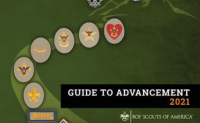Many regular readers of Scouting Magazine enjoy the feature What Would You Do? in which readers are asked to comment on a problem a Scouter is having in his or her unit. The March-April issue poses the question of how the seven older scouts in a troop should command respect when the 15-20 younger ones won’t follow them.
The first thing you have to ask is: Are your older scouts practicing servant leadership? Younger scouts don’t take well to being given orders, but boy leaders are all too happy to issue commands, especially to those younger and smaller than they are. The troop’s youth leaders need to understand that their role is to provide the training and resources that the younger ones need  in order to learn what needs to be done, why it needs to be done and how to go about it. The older scouts can do this by being a “model patrol” in which each scout has a responsibility and knows how to fulfill it. They can demonstrate how a patrol is supposed to function and, through their actions, illustrate that each scout has to do his part.
One should also examine the interactions that are taking place between the older scouts and the younger ones. Â Are older scouts randomly asking younger ones to do things? Remember, each patrol should be functioning as an autonomous unit. Members of the older-boy patrol shouldn’t be directly interacting with the younger patrols unless it’s a troop-wide or inter-patrol activity. They shouldn’t be meddling in the affairs of other patrols. A new-scout patrol would have a Troop Guide who, though being an older scout, is actually “embedded” with the new scout patrol and whose job is to advise and teach both scout skills and the ways of the troop. The only other interaction should be between the Patrol Leader of the younger-boy patrol and the SPL.
Finally, the key words in the question are “command respect”. Simply put, you don’t command respect; you earn it. It’s earned by showing respect. Older scouts can help younger scouts succeed, and earn their respect, by being helpful, friendly, courteous, kind – you get the picture – and gently showing them the way. Business leader H. Gordon Selfridge said it well:
- A boss drives people – a leader coaches them
- A boss depends on authority – a leader depends on good will
- A boss inspires fear – a leader inspires enthusiasm
- A boss says “Go.” – a leader says “Shall we proceed?”
Update: Clarke Green, in his Scoutmaster Podcast #55, also addressed the question from Scouting Magazine. I posted this article before listening to his podcast, but my views tend to agree with his. He adds more on the subject of respect. Listen to his podcast here.
This post first appeared on Bobwhite Blather.




Great Post! This is exactly what they taught us about at NLS. Keep up the good work here!